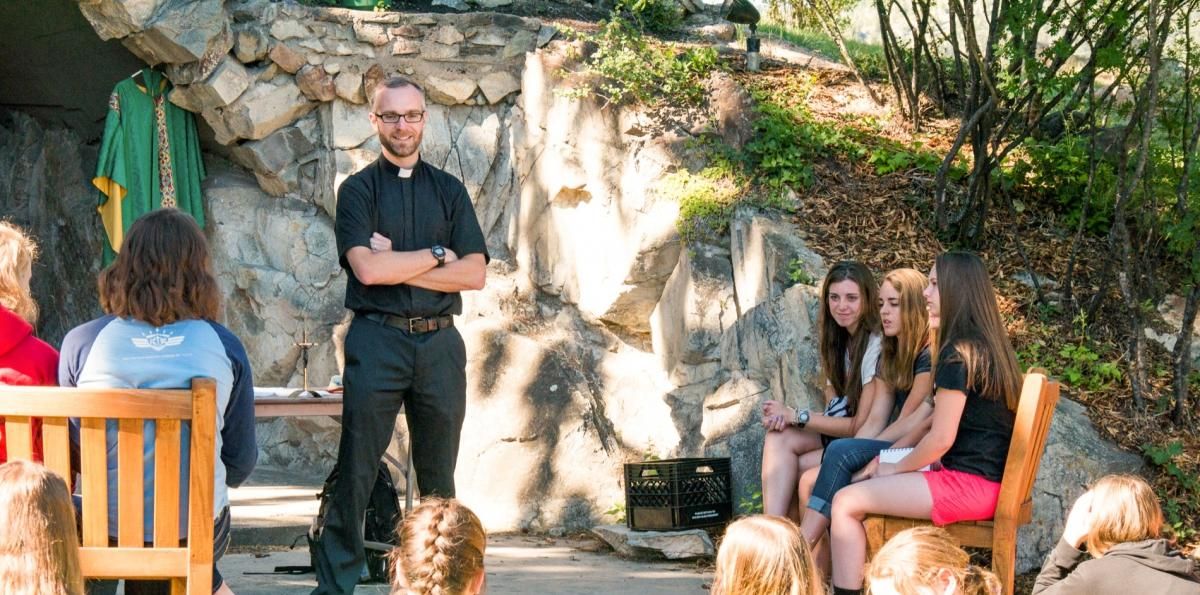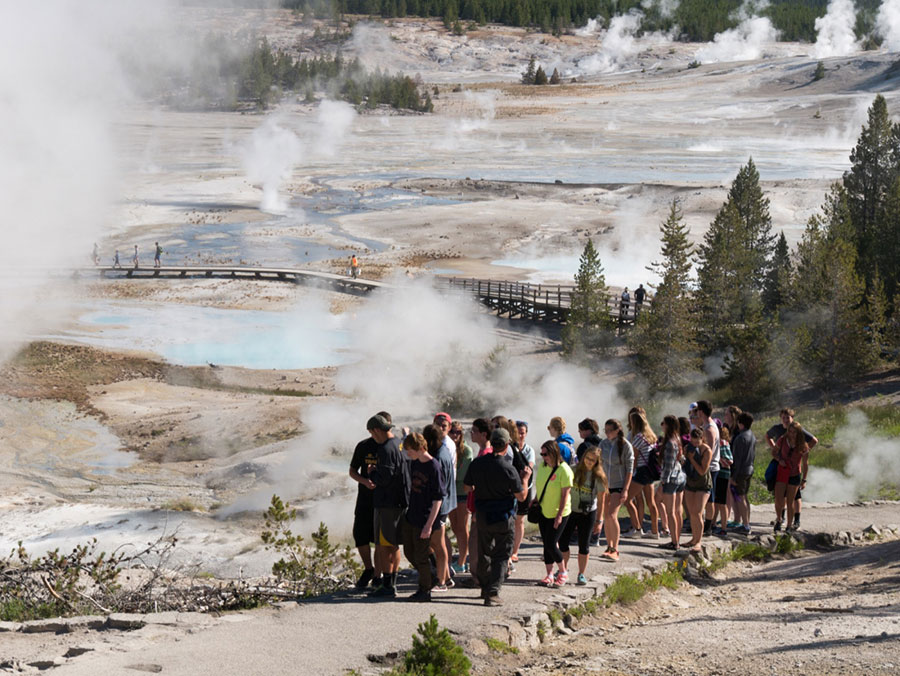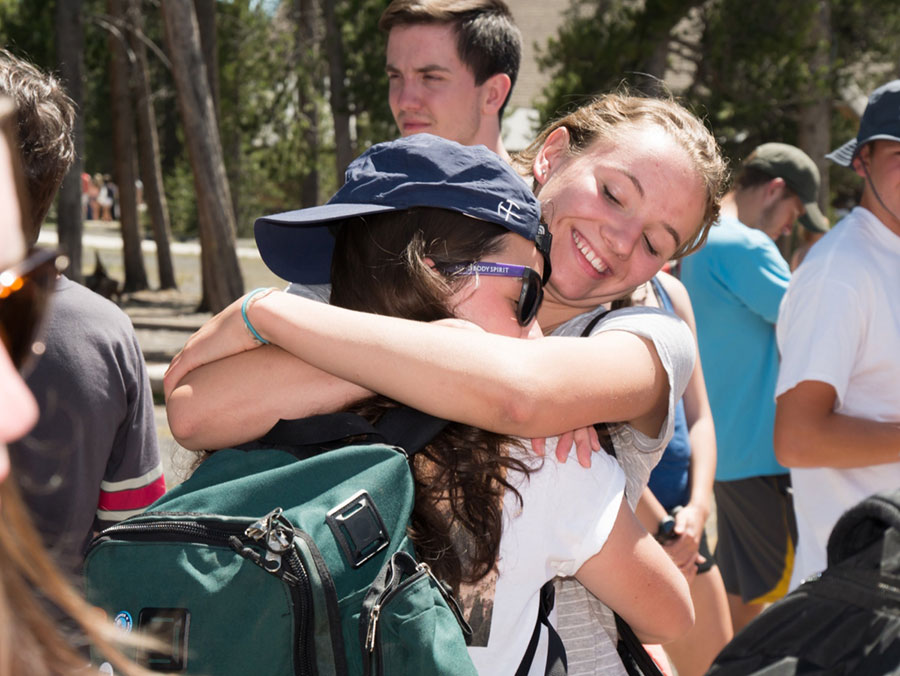Note: This article originally appeared in the 2016 edition of Carroll Magazine and has been adapted for the web
by Eric Hall, PH.D. , Associate Professor of Theology & Philosophy, Director of St. Kateri Institute and Archbishop Raymond G. Hunthausen Professor of Peace and Justice

Theology as an academic discipline is not an easy sell, and it hasn’t been for a long time. We don’t exist in the medieval university system anymore where theology and its study was considered the fulcrum and capstone to the study of all other sciences. To even put theology and science into the same sentence anymore elicits an eye roll from a broader culture that sees the ancient discipline as a relic of an era that should have died by now. As the atheistic critic and self-proclaimed intellectual Richard Dawkins has said, theology “is a betrayal of the intellect, a betrayal of all that’s best about what makes us human.”
Carroll College, of course, begs to differ. At Carroll, the department has decided to take these important obstacles head on in an attempt to reenvision the importance of theological education once more in a Catholic institution of higher learning.
The Carroll College Department of Theology faced a difficult moment in the spring of 2015. In a place of broader cultural isolation beyond institutional walls and with the number of majors understandably already dropping (how do you get a job with that degree?), the department tackled an important set of questions about its future, its purpose for the institution, its internal goals, and what it means to teach theology in the 21st century. It has since taken up that identity-defining task and is emerging from the other side with a number of answers now built into the major, its purpose, and its reach.
We begin where the department began: the truths of Catholic theology are not necessarily accepted by everyone, at least not in the same way that a truth in chemistry can be accepted anywhere by any person. Christian theology remains most important for Christian believers, especially those who, with St. Augustine in his Free Choice of the Will, accept that “something that is believed but not known has not yet been found.” Anyone can, of course, benefit from the study of Christian theology—which Catholics often understand as the rationale behind the way one prays—in the same way that anyone can benefit from the study of religion—grasping a system of life and thought diverse and even contradictory to one’s own. However, theology as a discipline is most important for those who already believe and who want to go deeper into their faith, its meaning, and its beauty.
For this reason, “Explore the Deep of Your Faith” has become the unofficial motto of the Carroll theology department, which is based loosely on Pope John Paul II’s famous dictum: “duc en altum” or “go out into the deep.” The department realized that, in order to once more become relevant, it had to appeal not simply to those who desire to go into seminary or grad school, both goals of which the members of the department would unabashedly support. It had to remember itself in light of the original and most lasting intent of theology: to open up the depths of Christian faith such that persons can move beyond the intellectual milk of their youth into the feast of reasoned and understood faith of adulthood.
Dr. John Ries, professor of theology and the department chair, says, “We’ve simplified the major while retaining its integrity this last year. We want to invite any and all persons, Catholic, more broadly Christian, or any person of good will to come and converse, argue, and break intellectual bread with us.”
It’s for these same reasons that Dr. Eric Hall, assistant professor of theology and philosophy and the Hunthausen Professor of Peace and Justice, said to the Carroll Board of Directors at its November 2015 meeting that “you ought to be ready for a future where your heart will drop as your child tells you that she’s getting a theology degree; just remember, it’ll be paired with something like business or psychology as well!"

The whole idea here is that theology is not and does not need to be a stand-alone degree. Theology, while academic to be sure, must be seen as what Cardinal John Henry Newmann calls integrative: a sort of discipline that floats in the upper atmosphere of the academy and, with other disciplines like philosophy (in the Catholic tradition), integrates a worldview, a set of values, and way of living. It sees and makes arguments about how all the facts of life fit together, what unites them and makes meaning of them. This is why the theology department asks all of its students to pair their theology major with another major, beckoning them to reflect not only on the truths of faith but how these truths affect each and every aspect of their intellectual and daily lives as well.
Opens image in a pop up window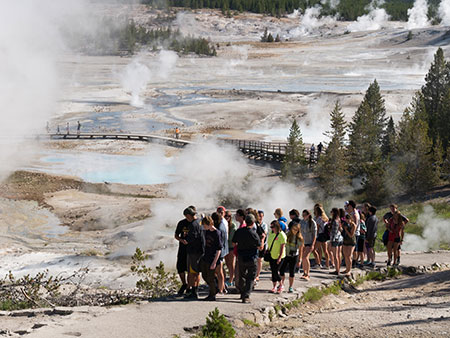 That’s not all. With a growing number of students, the department was able to more explicitly take up John Paul II’s dictum (duc en altum) as the Pope intended: to go out into the deep. Having moved from two to fifteen majors over the course of a year, the department heard the real demand of both its students and the institution, and the Church: not only to think fully but to serve thoughtfully. The department is now sending its students out into the deep as well as having them explore it through a recently developed ministry internship program.
That’s not all. With a growing number of students, the department was able to more explicitly take up John Paul II’s dictum (duc en altum) as the Pope intended: to go out into the deep. Having moved from two to fifteen majors over the course of a year, the department heard the real demand of both its students and the institution, and the Church: not only to think fully but to serve thoughtfully. The department is now sending its students out into the deep as well as having them explore it through a recently developed ministry internship program.
This new ministry program, offered as an emphasis within both the major and the minor, has placed interns at a number of institutions in Helena this past year, including the Cathedral parish, St. Mary parish, and Our Lady of the Valley parish. In the coming year, the net will spread even wider and include hospital chaplaincy work, as well as work with Our Redeemer Lutheran and the Helena Diocesan Chancery. The ministry program asks its students to engage in professional service in non-profit and ministerial work while reflecting theologically on the meaning of that work. In other words, this is where the rubber meets the road— where theology must become integrated into the everyday fabric of the students’ existence while informing the choices that the students make in the process. “Theology and our theology students become whole in this reflective form of service,” says Katherine Greiner, assistant professor of theology.
Opens image in a pop up window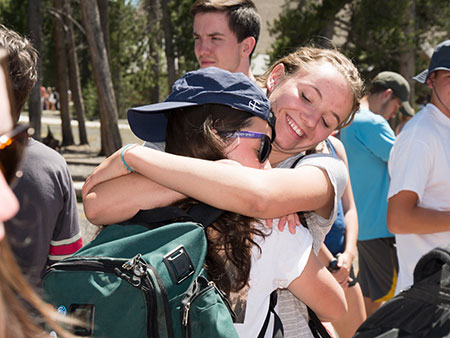 “There’s understandable and palpable excitement in the department for a number of good reasons,” reflects Dr. Gerardo Rodriguez, an assistant professor of theology, and now this excitement has spread far beyond the institutional walls. With this new vision in place, the department managed to win two important and prestigious grants. The first is from the M.J. Murdock Charitable Trust based out of Vancouver, Washington. The Vision and Call grant has created for the department the opportunity to select three theology majors per year for a second, paid internship for nine months within a ministry setting. The Trust will pay fully for these interns for two years, pay for 2/3 of their salary for two years after that, and pay for 1/3 after that, at which point the department plans to raise enough funds to keep the program in place. The Vision and Call fellowship ends with a capstone project where the students must integrate their experience performed ministry with its theological motifs, and another concept pertinent to whatever the student’ssecond major is. The grant provides the department with an amazing opportunity to serve both its Diocese and beyond, sending students out into the world to serve and care for it. Over the course of six years, this grant will have brought in over $80,000 by the time of its completion.
“There’s understandable and palpable excitement in the department for a number of good reasons,” reflects Dr. Gerardo Rodriguez, an assistant professor of theology, and now this excitement has spread far beyond the institutional walls. With this new vision in place, the department managed to win two important and prestigious grants. The first is from the M.J. Murdock Charitable Trust based out of Vancouver, Washington. The Vision and Call grant has created for the department the opportunity to select three theology majors per year for a second, paid internship for nine months within a ministry setting. The Trust will pay fully for these interns for two years, pay for 2/3 of their salary for two years after that, and pay for 1/3 after that, at which point the department plans to raise enough funds to keep the program in place. The Vision and Call fellowship ends with a capstone project where the students must integrate their experience performed ministry with its theological motifs, and another concept pertinent to whatever the student’ssecond major is. The grant provides the department with an amazing opportunity to serve both its Diocese and beyond, sending students out into the world to serve and care for it. Over the course of six years, this grant will have brought in over $80,000 by the time of its completion.
The second major grant comes from the Lilly Endowment Inc., based out of Indianapolis, Indiana. This grant for $355,000 helps to fund the startup and four years of maintenance of a high school educational institute called The St. Kateri Institute for Integrative Learning. As a sort of intellectual summer camp, the Kateri Institute provides high school youth with a spiritual and academic experience that develops their understanding of the relationship between faith and reason under the beautiful big skies of Montana. Through hikes in the greater Helena area, seminars given by Carroll theology professors, masses in the Carroll Grotto, a trip to Yellowstone National Park, and the work of an amazing set of Carroll College students who comprise the Institute’s counselors, participants explore the role of thinking—through the medium of the natural world—as a spiritual exercise.
The first Kateri Institute, which took place between June 25 and July 1, 2016, “continues to solidify Carroll’s commitment to young people and their training in mind, body, and spirit,” says Dr. Tom Evans, president of Carroll College. “We show through these kinds of programs our dedication to our mission: to be a beacon of light to Helena, the Diocese, and beyond, drawing new students and the broader community into Carroll and its dedication to beauty, goodness, and truth.”
In fact, the Institute begins to funnel the spirituality of high school youth toward a mindset that refuses to see prayer as unthoughtful or, conversely, to see thought as somehow contradictory to prayer. It introduces students through God’s works in nature to what Pope John Paul II calls the “two wings on which the human spirit rises to the contemplation of truth:” faith and reason. Dr. Hall says that “these students are, of course, more than welcome to continue to take up this reflection at Carroll!”
Will theology ever become the queen of the sciences again? Likely only in the minds of its students and teachers. Still, as intellectually integrative, service-oriented, and with new and powerful resources, theology has all of the sudden become a lot more attractive to all students of faith—Catholic and beyond.
Learn more about the Theology Department at Carroll College
,
